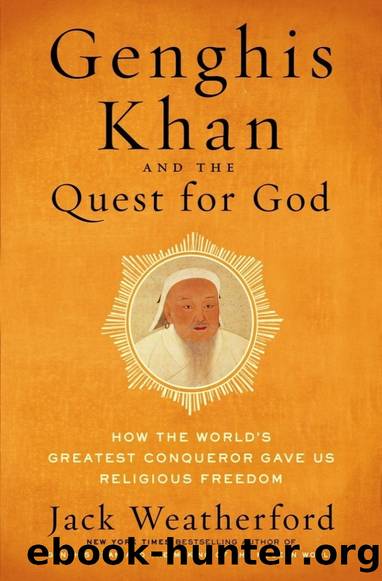Genghis Khan and the Quest for God: How the World's Greatest Conqueror Gave Us Religious Freedom by Jack Weatherford

Author:Jack Weatherford [Weatherford, Jack]
Language: eng
Format: epub
ISBN: 9780735221154
Google: S9gzDwAAQBAJ
Amazon: 0735221154
Barnesnoble: 0735221154
Goodreads: 28815475
Publisher: Penguin Publishing Group
Published: 2016-09-29T11:51:06+00:00
News of the Mongol defeat by the forces of Jalal ad-Din spread quickly throughout the former Khwarizm Empire. Compared with their own losses over the past two years, it was only a minor defeat, but it heartened them that the barbarians finally proved vulnerable. Defeating even this small army and then killing the survivors exposed the Mongolsâ weakness. As the news traveled with refugees and merchants from village to village and city to city, the people still holding out against the Mongols felt greatly encouraged, and many of those who had previously surrendered now revolted. They killed the officials left in place by the Mongols, even when they were Muslims and fellow Turks or Persians. The conquered people of Khwarizm resisted the Mongols at every opportunity and raided their baggage trains crammed with looted wealth.
The Mongol army had never been spread out over such a large area, and it was vastly outnumbered by the urban populations around it. At this point, a coordinated rebellion or organized army could have defeated it. Genghis Khan moved quickly and violently to put down the uprisings before they could become an organized campaign against him.
The people of Balkh, another city noted for its wealth and scholarship, famed as the home of the Bactrian princess Roxana, who had married Alexander the Great, rose up in rebellion. Juzjani informs us that afterward, âthe few remaining people, for the period of a full year, had to sustain life on the flesh of dogs and cats and human beings, for this reason that the forces of Chingiz Khan had burnt all the stores, barns, and granaries leaving not a grain of corn, and no cultivation whatever existed.â17 Some fifty thousand were killed, but one of the many families to escape was that of one of the greatest of Persian poets and mystics, Jalal ad-Din Muhammad Balkhi, better known in the West as Rumi. He spent much of his life fleeing the Mongols through Nishapur, Baghdad, and Damascus, and finally settled in Konya in modern Turkey, where he became a renowned scholar and Sufi teacher.
Despite his suffering at the hands of the Mongols, Rumi, noted for his generosity of spirit and deep spirituality, seemed accepting, almost forgiving. Finding some good in everything that happens, he even seemed to appreciate the peripatetic life that resulted from being forced to flee his home as a refugee.
Oh, if a tree could wander
and move with foot and wings!
It would not suffer the axe blows
and not the pain of saws!18
Download
This site does not store any files on its server. We only index and link to content provided by other sites. Please contact the content providers to delete copyright contents if any and email us, we'll remove relevant links or contents immediately.
| Buddhism | Christianity |
| Ethnic & Tribal | General |
| Hinduism | Islam |
| Judaism | New Age, Mythology & Occult |
| Religion, Politics & State |
Cecilia; Or, Memoirs of an Heiress — Volume 1 by Fanny Burney(31340)
Cecilia; Or, Memoirs of an Heiress — Volume 3 by Fanny Burney(30938)
Cecilia; Or, Memoirs of an Heiress — Volume 2 by Fanny Burney(30894)
The Secret History by Donna Tartt(16642)
Sapiens: A Brief History of Humankind by Yuval Noah Harari(13067)
Leonardo da Vinci by Walter Isaacson(11912)
The Radium Girls by Kate Moore(10914)
Sapiens by Yuval Noah Harari(4545)
The Wind in My Hair by Masih Alinejad(4427)
How Democracies Die by Steven Levitsky & Daniel Ziblatt(4407)
Homo Deus: A Brief History of Tomorrow by Yuval Noah Harari(4286)
Endurance: Shackleton's Incredible Voyage by Alfred Lansing(3850)
The Silk Roads by Peter Frankopan(3767)
Man's Search for Meaning by Viktor Frankl(3644)
Millionaire: The Philanderer, Gambler, and Duelist Who Invented Modern Finance by Janet Gleeson(3573)
The Rape of Nanking by Iris Chang(3518)
Hitler in Los Angeles by Steven J. Ross(3442)
The Motorcycle Diaries by Ernesto Che Guevara(3340)
Joan of Arc by Mary Gordon(3262)
